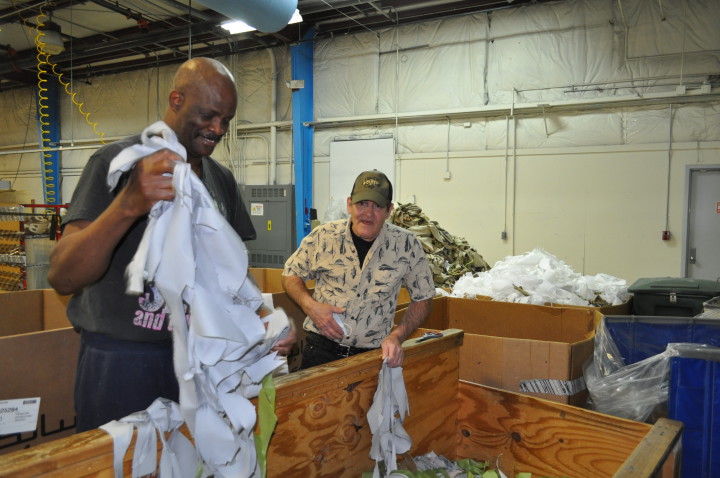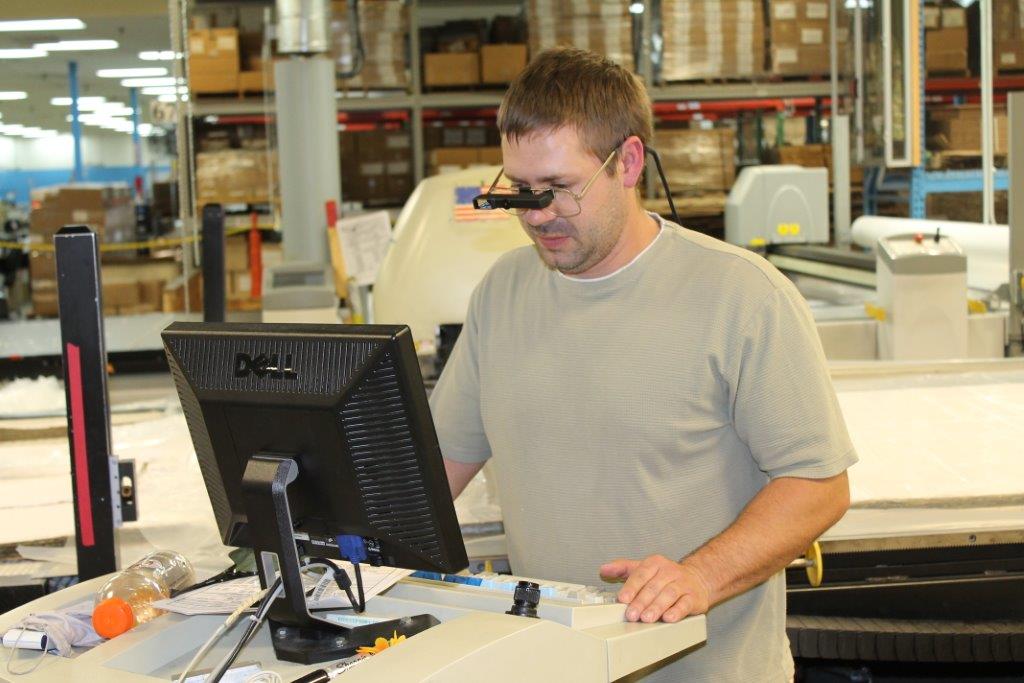Each day at work, Harry Umble stamps out elbow patches from rolls of fabric. The patches will be sewn on Army combat shirts. Umble, the 2012 Blind Worker of the Year at Industries for the Blind Asheville, is totally blind and slightly deaf.
Upstream from him, Chad Wilbur operates an industrial cutter that creates other fabric pieces. Wilbur is legally blind. He was named this year’s Blind Worker of the Year at IFB Asheville.
Wilbur is the only legally blind person who operates the cutter at IFBA, says Randy Buckner, director of operations for the facility at 240 Sardis Road in Asheville. “Typically, we’d have a sighted person running it, but Chad’s proven us wrong.”
And Umble is the first blind person to run his equipment, Buckner adds.
Laughing, Umble likens his machine to a biscuit cutter. “I really enjoy it. It keeps me out of trouble,” he says.
IFBA has provided services and resources for its visually impaired employees and the Asheville community since 1938. “IFB employs both totally blind and legally blind folks,” Buckner reports. “Through our Low Vision Center, we also provide services to the vision impaired, who may need assistance in improving their eyesight to restore some personal independence.”
The organization employs on average about 100 people, of whom, 75 to 80 percent are either legally or totally blind.
IFB produces a wide variety of materials — from repackaged household and military commissary items to office supplies, bags and apparel for military and government agencies — but there is very little waste thanks to a recently implemented recycling program.

IFBA’s recycling program, begun in 2011, has been limiting its impact on the environment, Buckner says. Last year, the program kept roughly 536,000 pounds of reusable materials out of the landfill and created two full-time positions at its plant in the process.
Each piece of apparel is produced primarily by workers who are either legally blind or totally blind, with some oversight from sighted employees. “We provide the cut work here, what we call ‘cut kits,’” Buckner explains. “Anything from cold-weather trousers to Army combat shirts,” which are then sent out to be sewn together by Federal Prison Industries employees and shipped across the globe.
Inside the Sardis Road plant, large swaths of fabrics lie draped over a long, perforated table that Buckner jokingly refers to as “the world’s largest air hockey table.”
When workers turn on the table, it floats the material, so a person can move it into position to be cut, at which point the operator can set the table to vacuum mode, to hold the material in position to be cut.
The cutter, which looks like an industrial-size electric turkey carver attached to a mechanical arm, is computer-controlled.
One plant’s trash, another’s treasure
With such a high volume of products packaged or produced on-site, a prodigious amount of waste material is inevitably produced. “We cut 80,000 to 100,000 cut kits a month,” Buckner says. “So even though we use the majority of the fabric, there’s still a lot of waste.”
Before the implementation of the recycling program, most of that waste went to the landfill. Since introducing the recycling program, however, IFB Asheville has been able to recycle more than 90 percent of the waste it produces, including excess fabrics, cardboard, paper, and just about anything else for which a use can be found.
IFBA partners with several recycling companies, including American Recycling, about 1.5 miles from IFBA’s plant.
It’s a full circle,” adds Buckner. “You’re helping the landfill out, creating jobs and generating revenue in the area because they’re able to reuse that material and create other products to resell.”
Walter Chambers and Wayne Richman are in charge of sorting leftover fabrics from the sewing operations into several containers. Both men are legally blind but manage to sort through the materials based on what they can see and by feel.

“We have separate boxes for different materials like cardboard, colored paper and bag paper,” Richman says, demonstrating the procedure. “We keep them separate because stuff like the white paper is worth a little more than the colored paper, plus some of the materials are going to different places.”
He shows off a guidebook he devised to help new employees learn the difference in the materials. “I try to keep [the guidebook] updated all the time since the materials change pretty often.”
For his part, Chambers says he’s happy to have a job where he knows he’s making a difference. “It’s not the funnest job in the world, but it’s an important one and a job that has to get done,” he notes. “You’ve got to be able to do stuff, and you’ve got to enjoy what you do.”
Moreover, the entire facility makes a conscious effort to recycle what it can, notes Wilbur. “If we have a beverage [container], it’s recycled,” he says. “There’s recycling bins all over the place. Our forklift driver won’t let us get away with throwing stuff out — she’s the environmental police!”
He adds that the recycling program is emblematic of IFB’s larger goals. “It’s awesome to work for a company that offers something like that,” he says. “You take people like Randy, and you see how passionate and driven they are. It’s a good example. And if I bump into something, they don’t laugh at me, because they’re used to it.”
For more information about Industries for the Blind Asheville, to learn more about employment opportunities and community outreach programs, or to find out how you can contribute to its services and fundraisers, visit wsifb.com.




Before you comment
The comments section is here to provide a platform for civil dialogue on the issues we face together as a local community. Xpress is committed to offering this platform for all voices, but when the tone of the discussion gets nasty or strays off topic, we believe many people choose not to participate. Xpress editors are determined to moderate comments to ensure a constructive interchange is maintained. All comments judged not to be in keeping with the spirit of civil discourse will be removed and repeat violators will be banned. See here for our terms of service. Thank you for being part of this effort to promote respectful discussion.